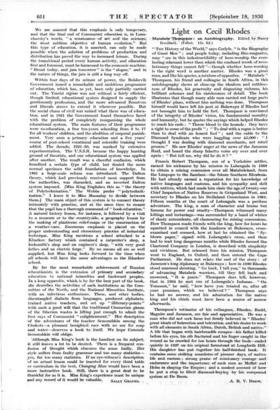Light on Cecil Rhodes ,
" THE History of the World," says Carlyle, " is the Biography of Great Men " ; and people today, including film-magnates, may ".see in this indestructibility of hero-worship the ever- lasting adamant lower than mbich the confused wreek of revo- lutionary things cannot fall "—though whether hero-worship ' is the right' word is another matter. Rhodes was a great man, and like his species, a mixture of opposites. " Matabele " Thompson, his friend and colleague in South Africa, in this . autobiography shows at close-up the idealism and ruthless- ness of Rhodes, his, generosity and disgusting richness, his brilliant schemes and his Cereleisness of detail. The book illustrates that though many able men carried out large parts of Rhodes' plaps, without him nothing was done. Thompson himself would have left his post at Bulawayo if Rhodes had not besought him to hold the fori. Thompson is convinced of the integrity of Rhodes' vision, his fundamental morality and humanity, but he quotes the sayings which helped Rhodes to reach his ends : " Throw blood to the hounds : they have a right to some of the profit " ; " To deal with a rogue is better than to deal with an honest fool " ; and the cable to the Diamond Syndicate who were haggling over 15,000 : " I thought I was dealing with diamond merchants, not retail grocers." He saw Rhodes' anger at the news of the Jameson Raid, and heard the sharp falsetto voice cry over and over again : "But tell me,, why did he do it ? "
Francis Robert Thompson, son of a Yorkshire settler, earned his nickname by his mission to Lobengula in 1888 to obtain a mining concession over all Matabeleland, from the Limpopo to the Zambesi—the future Southern Rhodesia. He had already earned a reputation for his knowledge of native languages and customs, and his sympathy and skill with natives, which had made him since the age-of twenty-one Chief Inspector-of Native Reserves in Griqualand West, and secretary to Rhodes on. his Stellaland Commission in 1884: Fifteen months at the, court of Lobengula was a perilous adventure. The king, a man of character and brains but famous for power and cruelty—Thompson witnessed many killings and torturings—was surrounded by a band Of whites of shady antecedents, .all clamouring -for mining concessions.
How Thompson made with the king, how for hours he squatted in council with the headmen • at Bulawayo, cross- examined .and' accused, how at last -he obtained the " fly- blown paper," signed with ,Lobengula's cross, and then had to wait long dangerous months while Rhodes formed the Chartered Company in London, is described with simplicity and vividness. But released from his mission, Thompson went to England, to Oxford, and then entered the Cape, Parliament. He does not relate the end of the story : of Jameson's long diplomacy at Bulawayo ; how in 1890 Rhodes stood unarmed shouting, " Go back, I tell you," to thousands of advancing Matabelc warriors, till they fell back and answered, " It is peace." Thompson does tell, however, that in 1904 he met one of Lobengula's Indunas. " Ou Tomoson," he said, " how have .you treated us, after all your promises, which we believed " Thompson says he had no answer, and his admiration for the native king and his chiefs must have been a source of sorrow afterwards.
Thompson's estimates of his colleagues, Rhodes, Rudd, Maguire and Jameson, are fair and appreciative. He was a man who did not seek fame but firmly believed in " Rhodes' great ideals of federation and toleration, and his desire to work with all elements in South Africa, Dutch, British and native." A life that began with hairbreadth escapes—his father killed before his eyes, his rib fractured and his finger caught in the wound as he crawled for ten hours through the bush—ended quietly in 1927 on his original farmstead at Longforth Hill. His daughter has put together his half-finished book. It contains some striking anecdotes of pioneer days, of 'native life and custom ; strong praise of missionary courage and endurance and the importance of such men as Moffat and Helm in shaping the Empire; and a modest account of how he put a stop to illicit diamond-buying by his compound system at De Beers.
A. B. V. DREW.










































 Previous page
Previous page